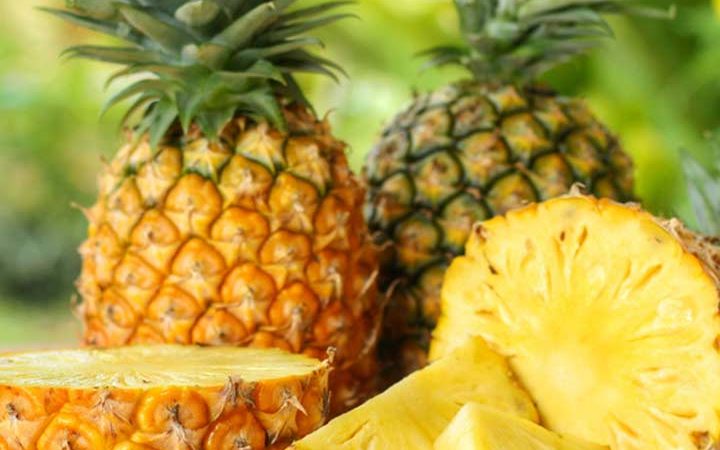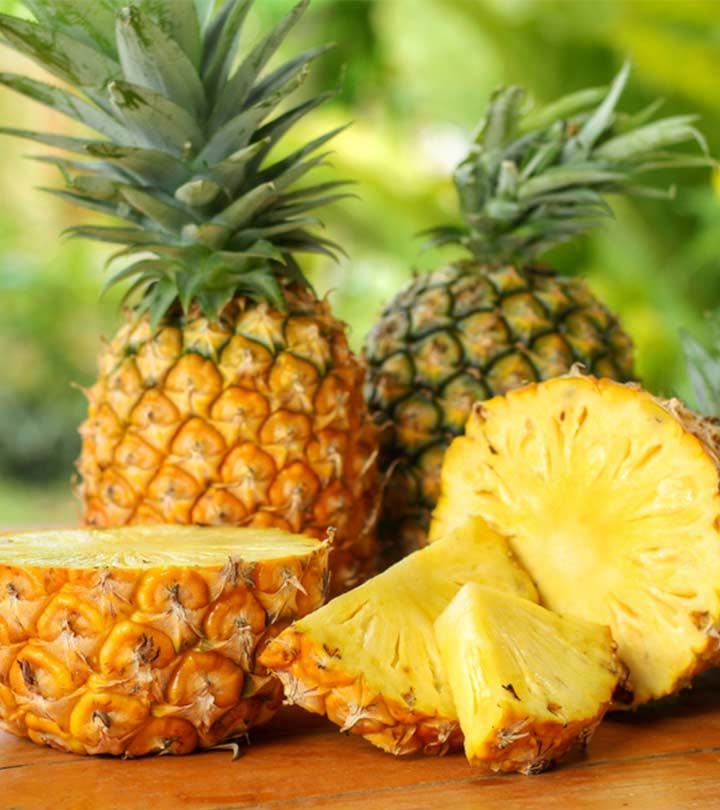Pineapple is a hydrating fruit containing several vital nutrients, dietary fiber, and bioactive compounds that help maintain long-term health (1). Several of these nutritional components can pass into breast milk and benefit the baby as well. But since pineapple is acidic, it’s believed to cause diaper rash in sensitive breastfed babies. It leaves several mothers wondering if they should eat pineapple when breastfeeding.
This post answers your questions and shares the benefits of pineapple for nursing mothers and ways to include this flavorful fruit in the breastfeeding diet.
Can Nursing Mothers Eat Pineapple?
Yes. Pineapple is a nutritious fruit that you can consume when nursing.
There are no research studies to corroborate the belief that breastfed babies get diaper rash due to their mother’s intake of acidic fruits. Instead, it’s the babies’ consumption of acidic fruits, such as citrus fruits, which may lead to diaper rash, especially in sensitive babies (2).
Nevertheless, if you suspect any food, including pineapple, is affecting your baby, eliminate it from the diet for a few days and observe the change. If your baby shows improvement in their health, it is most likely that the food item was affecting them through breast milk.
Nutritional Value Of Pineapple
Pineapple has several varieties with varying nutritional values. On average, one cup of pineapple (165g) can offer a nursing mother the following nutrients to contribute to her nutritional needs during the lactation period and beyond (3)(4).
| Nutrients | Amount | RDA* |
|---|---|---|
| Water | 142g | – |
| Energy | 82.5kcal | – |
| Carbohydrate, by difference | 21.6g | – |
| Fiber, total dietary | 2.31g | 34g |
| Calcium, Ca | 21.4mg | 1000mg |
| Magnesium, Mg | 19.8mg | 310mg |
| Phosphorus, P | 13.2mg | 700mg |
| Potassium, K | 180mg | 2800mg (AI) |
| Vitamin C, total ascorbic acid | 78.9mg | 120mg |
| Folate, total | 29.7µg | 500mg |
Source: USFDA and Dietary Guidelines For Americans 2020-2025
* RDA for lactating mothers between the ages of 19 and 30 years.
AI = Adequate intake – nutrient level assumed to ensure nutritional adequacy.
Possible Health Benefits Of Pineapple
Pineapple is known to have several medicinal and therapeutic properties. Most of these properties are attributed to bromelain, an enzyme found in the fruit and stem of pineapple (5). Here’s a brief overview of some of the benefits you could reap from eating pineapple as a part of your well-balanced breastfeeding diet.
- Offers hydration: 165g of pineapple gives approximately 142g of water, making pineapple a hydrating fruit. Since breastfeeding moms need plenty of water to keep their breast milk production going, adding pineapple to your breastfeeding diet is a good choice (6). Besides water, pineapple also provides several micronutrients to promote postpartum recovery and benefit long-term health.
- Provides several nutrients: Pineapple contains significant amounts of vitamin C and essential nutrients, such as potassium and folate, which could contribute to a nursing mother’s nutritional needs. Some of the nutrients, such as vitamins, can also pass to the breastfeeding baby in small quantities through breast milk (7).
- Gives dietary fiber: A nursing mother needs about 34g of fiber daily. Pineapple being a fiber-rich food, can help meet this requirement. Dietary fiber is essential for adding bulk to the diet and keeping the bowel movement smooth. Since several mothers experience constipation during postpartum, pineapple can be a good choice for them.
- Offers antioxidants: Pineapple is rich in vitamin C, a vital vitamin that acts as an antioxidant and fights free radical damage to improve long-term health. In addition, it has bromelain, flavonoids, and phenolic compounds, such as coumaric acid, ferulic acid, chlorogenic acid, and ellagic acid, which also confer antioxidant effects essential for robust immune system functioning (8).
Besides these benefits, pineapple is known to have anti-inflammatory, analgesic, and antimicrobial properties. Perhaps, it’s why the use of pineapple flesh and juice is prevalent in treating ailments, such as sore throat and seasickness, in folk and traditional medicine (9).
Tips To Select And Store Pineapple
Proper selection and storage of pineapple are vital to ensure you reap its benefits to the fullest. Here are some simple tips you can follow while buying pineapple.
Selecting a pineapple
- Look for a pineapple with dark green leaves and a greenish-yellow exterior. These attributes indicate that the pineapple is ripe and fresh.
- Hold the pineapple in your hands and squeeze it. A ripe pineapple has a firm shell and feels soft when you squeeze it.
- Pick a pineapple that feels heavy for its size. Heavy pineapples are often juicier, sweeter, and riper.
- Sniff the base of the pineapple. A fresh and fully ripe pineapple smells sweet and pleasant.
- Discard pineapples with soft spots and bruises with the juice oozing out of them. Ensure the pineapple you pick doesn’t have any darkened eyes.
Storing a pineapple
- Once you bring pineapple home, clean with a damp cloth to remove any dust, dirt, or debris.
- Store the pineapple at the kitchen counter if you plan to consume it within two to three days. Otherwise, keep it in a perforated plastic bag and store it in the refrigerator for three to five days.
- Store cut pineapple in a glass or BPA-free airtight plastic container in the refrigerator.
Ways To Add Pineapple To Your Breastfeeding Diet
You can consume fresh or frozen pineapple in a salad or make its juice (with pulp) and prepare nutritious lactation smoothies. Alternatively, you can use pineapple to tenderize tough meat cuts or enhance a sweet or savory dish’s flavor. Irrespective of your choice, remember the following points.
- Eat pineapple in moderation as a part of a well-balanced diet.
- Use fresh pineapple as much as possible. If fresh pineapple isn’t available, you can opt for frozen pineapple.
- Use canned pineapple cautiously. Most canned fruits are preserved in sugar syrup, so they are high in calories. Therefore, look for canned pineapple preserved in its juice or water.
Pineapple is a tropical fruit that nursing moms can add to their breastfeeding diet. The fruit is rich in nutrients and bioactive compounds that can aid postpartum recovery and boost long-term health. You can eat pineapple raw in a salad or use it to make a sweet-tangy tropical mocktail or smoothie. Alternatively, you can add pineapple pieces to sweet and savory dishes to enhance their flavor and nutritional value.
References:
MomJunction’s health articles are written after analyzing various scientific reports and assertions from expert authors and institutions. Our references (citations) consist of resources established by authorities in their respective fields. You can learn more about the authenticity of the information we present in our editorial policy.



































